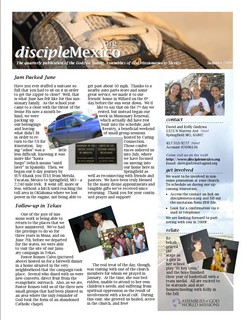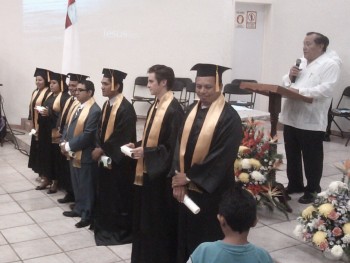Today during the afternoon service, I will be sharing about two of the seven words from the cross that Jesus spoke. I’d like to share one of those with you on this day that we remember our Saviour’s death:
Father, forgive them, for they do not know what they are doing. –Luke 23:34
 Beaten, bloody and tired, Jesus now hung from the cross. Just hours before, He moved freely about the city, teaching and celebrating the Passover with His disciples, but now He had been arrested, judged, and condemned. The hands that had healed the sick, the arms that had reached out to children, the feet that had walked in search of the lost had been stopped–nailed unjustly to the wood.
Beaten, bloody and tired, Jesus now hung from the cross. Just hours before, He moved freely about the city, teaching and celebrating the Passover with His disciples, but now He had been arrested, judged, and condemned. The hands that had healed the sick, the arms that had reached out to children, the feet that had walked in search of the lost had been stopped–nailed unjustly to the wood.
Jesus, the only truly innocent one of all now paid a debt that He didn’t owe. He never blasphemed God, yet the priests handed Him over to Pilate for this offense. He never tried to raise up a rebellion against Rome, but over His head was the charge, “Jesus, King of the Jews.”
In this moment, He exemplified the classic picture of a victim: a man who, for no fault of his own had to suffer. Nevertheless, Jesus Himself rejected this description. Moments before, Jesus redirected the pity of the women who had met him on the way saying, “Don’t cry for me. Cry for yourselves and your children instead.” In front of Pilate, Jesus rejected his intervention, explaining that that the authority that He recognized came from a place higher than Rome, and in the Garden of Gethsemane, Jesus allowed His power to flow when the soldiers who came to arrest Him fell down before Him. Obviously, it was something else that held Him to the cross.
It was love. It was the power of the only One who knew what He was doing. Among all of those who played a part in His crucifixion, Jesus was the only one truly free. The others were like the priests, who had been blinded by their rage, or like Pilate, deceived by his supposed authority, or like His disciples, trapped by their fear. Jesus suffered from none of these delusions.
From the beginning, Jesus understood his purpose–to give His life as a ransom for us all. Whatever doubt that he had held on to left at the Garden with his declaration, “Father, not my will, but yours be done.” Now with these words, “Father, forgive them,” He shows the culmination of His power. Jesús, as the only one who never sinned, as the only one who remained pure, as the only God-Man, refused His right of vengeance, and in that moment, in that act of pure love, He granted them their pardon.
He freed those who were still cursing Him, those who couldn’t understand that that man on the cross was their only hope They didn’t know what they were doing, but Jesus knew. He knew that it would mean His humiliation and His death but even so, He did it. What is more, in His love He removed their guilt.
But it wasn’t only the soldiers and the priests and Pilate that crucified Jesus on that day some two thousand years ago. You and I are responsible as well. The Bible says that all of us had gone astray to commit sin, and Jesus carried all of those sins on the cross. He died for us even when we had not yet realized our need for Him. In other words, while we were blind like the priests, or deceived like Pilate or tormented like His disciples, Jesus extended His forgiveness to us. He removed our guilt for His death from us as well.
In addition, with the words, “Father forgive them,” Jesus extends to us an opportunity. Jesus promised, before He returned to the Father that, in this word we would have trouble, but counseled us to take heart, for He had overcome the world. But, how did He overcome? Certainly not by His miracles or by His teaching, because, having done all of that they still crucified Him. No, He conquered it through His love–the love that put up with rejection, that endured the Roman lashing, and that suffered the crucifixion, the love that gave forgiveness instead of condemnation. And we, being His hands and feet can follow Him in His example.
What problems do we have? Abandonment? Rejection? Pain? Jesus suffered all of these, but never became their victim. Now, what will we do? We have the opportunity to triumph with Jesus. We have the opportunity, today, to extend forgiveness. Maybe those who have mistreated us don’t deserve it, but neither did we, and we accepted it. Let’s follow Christ then. Let’s be victors and offer, like Him, forgiveness.
 That’s right our newsletter is headed to the printer. But if the wait for our print edition is too much to bear, you can download it now before it hits your mailbox!
That’s right our newsletter is headed to the printer. But if the wait for our print edition is too much to bear, you can download it now before it hits your mailbox!







 Beaten, bloody and tired, Jesus now hung from the cross. Just hours before, He moved freely about the city, teaching and celebrating the Passover with His disciples, but now He had been arrested, judged, and condemned. The hands that had healed the sick, the arms that had reached out to children, the feet that had walked in search of the lost had been stopped–nailed unjustly to the wood.
Beaten, bloody and tired, Jesus now hung from the cross. Just hours before, He moved freely about the city, teaching and celebrating the Passover with His disciples, but now He had been arrested, judged, and condemned. The hands that had healed the sick, the arms that had reached out to children, the feet that had walked in search of the lost had been stopped–nailed unjustly to the wood.


